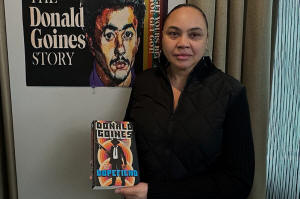Documentary aims to unlock the unsolved killing of Detroit urban fiction
writer Donald Goines
[March 13, 2025]
By COREY WILLIAMS
DETROIT (AP) — Who killed Donald Goines?
Producers of a documentary on the life of the prisoner-turned urban
fiction writer of novels about the violence, drugs and prostitution that
he surrounded himself with in Detroit are hoping the answer hasn't been
lost to time — or the streets.
It's been more than 50 years since Goines and his common-law wife,
Shirley Sailor, were found shot to death on Oct. 21, 1974, in their flat
in Highland Park, a small enclave of Detroit. Each had been shot five
times. Their two young children were home at the time of the killings.
No arrests were made and rumors swelled. Some speculated the killings
had something to do with 37-year-old Goines' heroin addiction. Others
nodded to the theory that the fictional subjects of his novels appeared
a bit too much like the real-life hustlers, pimps, drug dealers and
stickup men who prowled the city's streets.
“There have been at least a half-dozen, quite possibly a dozen, elements
of speculation as to how Mr. Goines and the mother of his children were
murdered,” said Bill Proctor, a private investigator hired to find the
killer or killers. “But no one has come forward with enough information
to charge the persons responsible.”
Shaking ‘the trees’
Proctor said a $5,000 reward being offered by the producers of the
documentary might help “shake the trees” and find “someone who might
still be alive or have an understanding” of the facts of the case.
Goines wrote 16 books over a short span of several years. His raw, stark
and undiluted writings are filled with the urban street life imagery of
the late 1960s and early 1970s.

“Dopefiend,” was published in 1971. Fifteen more including “Street
Players,” “Daddy Cool” and “Kenyatta's Last Hit,” would follow over the
next three years. The titles and the content resonated with many Black
readers, especially in Detroit where Goines' books often held prominence
on living room coffee tables and bookshelves.
“When I read his books, I can visualize — I can picture what he’s
writing about,” said his daughter, Donna Sailor. “He was so descriptive
about what he wrote. That’s kind of like how it was back then.”
Donna Sailor was 2 when her parents were killed. She doesn’t remember
anything about the shooting or her parents.
“We would see friends of the family that knew my dad and my mom,”
Sailor, 52, told The Associated Press Thursday. “They would say she was
a sweetheart, and she was funny and had a great smile.”
Less information about Goines was volunteered, though, she added.
“No one ever went into great detail about him. They would say he was a
nice guy,” said Sailor.
[to top of second column]
|

Donna Sailor poses next to poster of upcoming documentary about the
life of her father and urban literature writer Donald Goines on
Wednesday, March 12, 2025 in Detroit. (AP Photo/Corey Williams)

Iceberg Slim to Goines
The urban lit genre dates back at least to 1967, and the release of the
memoir “Pimp,” written by Robert Maupin, who also was in jail when he
began writing under the name Iceberg Slim. Maupin built a large
word-of-mouth following and one of his readers was Goines. Generations
later, hip-hop stars like Tupac Shakur were also inspired by the books
and have referenced Goines and Iceberg Slim in their recordings. Shakur
even once declared: “Machiavelli was my tutor, Donald Goines my father
figure.”
Goines' parents owned a clothes-cleaning and other businesses in Detroit
and were part of the city's Black middle class. He enlisted in the Air
Force and spent time in Korea and Japan during the Korean War. It was
there Goines became addicted to heroin, according to various reports on
his life.
After his time in the military, Goines returned to Detroit in the
mid-1950s. He drifted into the city's criminal underbelly, finding
himself jailed for various crimes.
Holloway House published Goines' novels from 1971 to 2008, according to
current publisher Kensington.
Under Kensington, Goines books have sold about 500,000 copies in print,
alone. He consistently is one of Kensington's top reordered authors and
his books have been “selling at a stronger pace” since it launched a
reissue program in 2020, according to the company.
Telling his story
Robert (Tape) Bailey and Craig Gore are the driving forces behind the
documentary which is expected to be released by the end of the year.
Both read Goines’ books while incarcerated, separately.
Bailey, 49, was born in Detroit and now lives in Los Angeles. He spent
time in federal prison as a young man for possession with intent to
deliver drugs in Ohio.
Goines wrote in detail about things he had witnessed, Bailey said.
Gore, 51, of Los Angeles, stumbled onto Goines while serving time for
burglary and theft. He says that through the $5,000 reward, they hope to
bring more accuracy to the documentary.
“We might find nothing. We might solve the murder,” he said.
All contents © copyright 2025 Associated Press. All rights reserved
 |